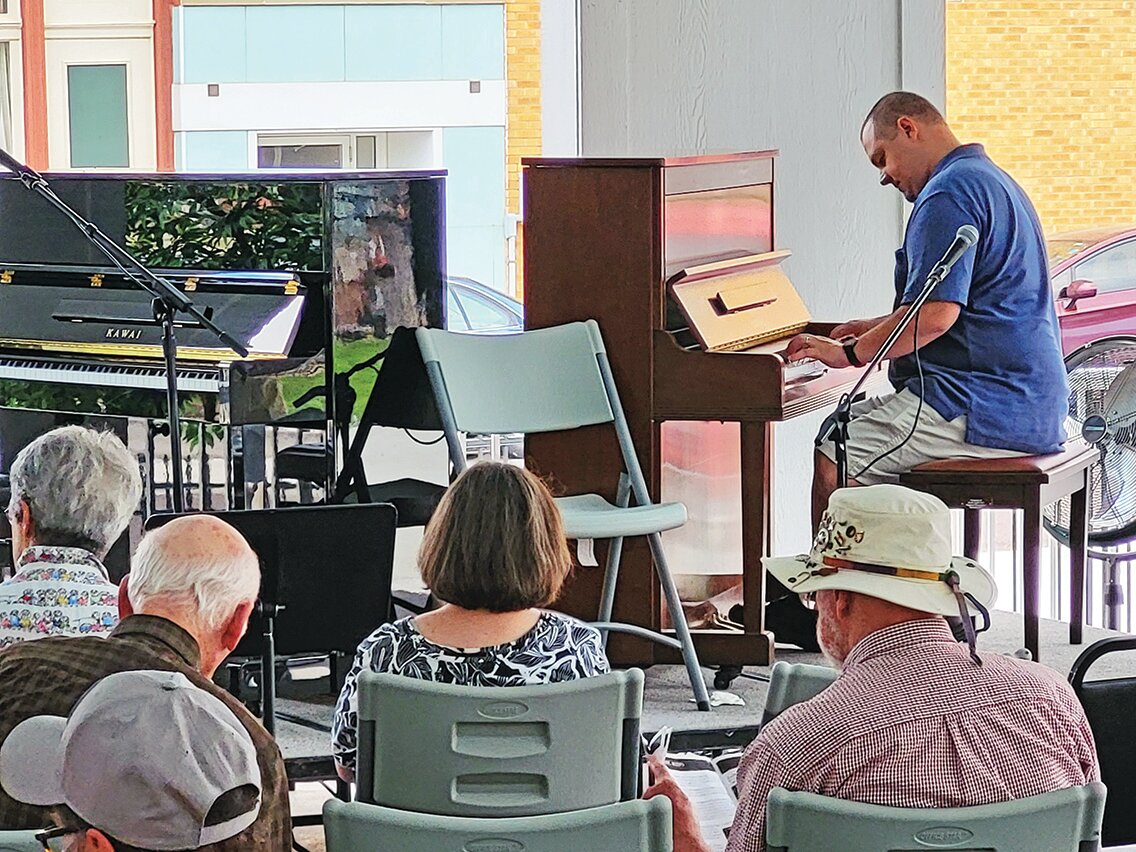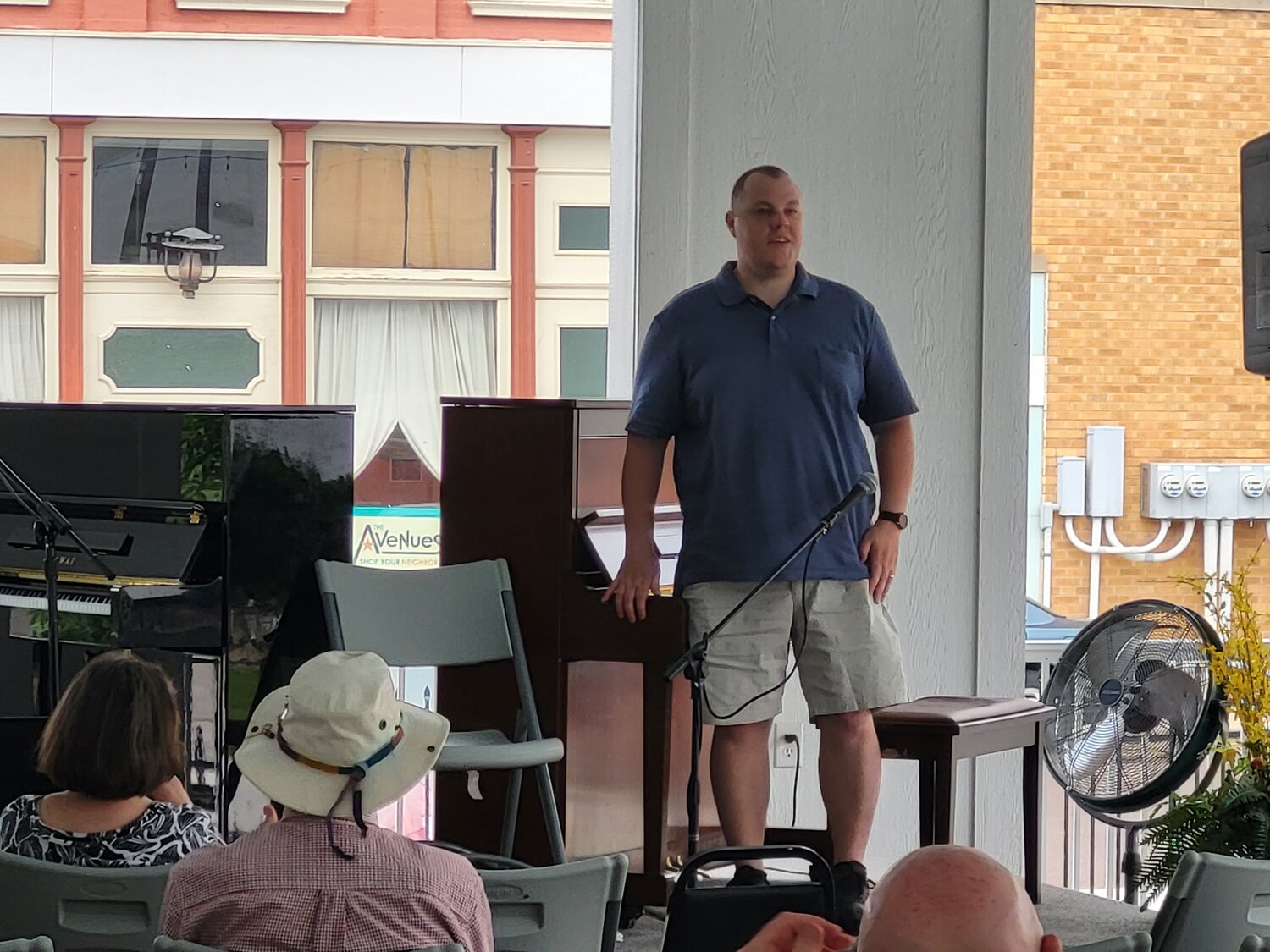Ragtime enthusiast finds God at Mass and in the masses

A blaring train whistle added a coda to Brandon Byrne’s outdoor interpretation of Scott Joplin’s “Sycamore Rag.”
“It’s just part of the atmosphere here,” Mr. Byrne acknowledged before moving ahead with Joplin’s “Silver Swan.”
Mr. Byrne was a featured performer at this year’s Scott Joplin International Ragtime Festival.
His sweeping piano chords and overlapping rhythms echoed off the 19th-century buildings lining Sedalia’s Ohio Avenue and its signature “kink.”
“Music is beautiful, and beauty is directly related to God,” Mr. Byrne pointed out later in an interview.
“I feel like God’s fingerprints are on anything beautiful,” the devout Catholic stated, “because he made his creation very good. And anything that reflects that beauty will draw people to God himself.”
Setting Mr. Byrne apart from other ragtime performers is the distinction of having composed three musical arrangements of the Catholic Mass.
“I’m Catholic for life,” he stated. “It’s been such a good thing for me to practice my Catholic faith.
“My relationship with God is the most important thing to me by a long, long shot,” he said. “It’s the guiding principle of my life, and I’d be nothing without it.”
Mr. Byrne’s first liturgical arrangement, “Mass of the Alabaster Jar,” recalls the anointing of Jesus at Bethany during Holy Week (John 12:1-8), and is dedicated “to my beautiful, irreplaceable children.”
The second, “Mass of St. Veronica,” is inspired by the woman who wiped Jesus’s face while he was carrying his cross to Calvary, and is dedicated to “my wonderful wife, Veronica Byrne.”
The third, “Mass of Christ the Morning Star,” points to a phrase from the Easter Proclamation, sung each year during the Easter Vigil.
“There are parts of the Proclamation that touch my heart very deeply,” said Mr. Byrne. “Like the line where the deacon or cantor sings, ‘Christ, the Morning Star that never sets’ — like that singular light in the sky in the middle of darkness.”
The composer’s goal for each of these settings was to make them easy to sing and easy to accompany.
“I live in the ‘Thumb’ of Michigan,” he noted. “It’s a very agrarian society and more sparsely populated than the metro areas down by Detroit. They don’t have access to as many resources.
“So, I wanted to write music that’s easy to do but is still well drafted and qualifying as art music,” he said.
He’s happy to send these arrangements to anyone who writes to him at brandonbyrnemvm@gmail.com.
“They’re all free,” he stated. “Everyone can just copy and print them as needed.”
Rocking the cradle
The Scott Joplin Festival, first held in 1974, celebrates Sedalia’s distinction as the “Cradle of Ragtime,” where Joplin composed his wildly popular “Maple Leaf Rag” in 1899 and set off an international ragtime craze in the process.
This all took place within sight of where the city's original St. Vincent de Paul Catholic Church once stood, in the heart of a railroad community once known for having equally plentiful churches and taverns.
Joplin, who was African American, was trained in classical European musical theory and composition, allowing him to meld provocative melodies and beautiful chords with African-style syncopated rhythms that give ragtime its signature “bounce.”
With syncopation, the rhythm systematically overlaps the melody the way bricks overlap each other on a wall.
Scholars point to Classic Ragtime as the first uniquely American form of musical expression, out of which all others evolved.
The annual festival also honors Mr. Joplin as a teacher and mentor.
“Here in Sedalia,” wrote historians Rudi Blesh and Harriet Janis in They All Played Ragtime, “as in every town where he settled for any length of time, were the gifted youngsters whom Joplin with his sense of the importance of syncopated music, would teach and encourage.”
“Veronica’s Lullaby”
Mr. Byrne’s fascination with ragtime dates back to his first Scott Joplin Festival, when he was 12.
“My grandma and step-grandpa lived in Kansas City, Kansas, at the time, and they had heard about the festival,” he recalled. “So, I flew on a plane to visit them, and they took me on an outing to Sedalia.
“After that, I was just completely hooked on it,” he said.
His parents signed him up for piano lessons, and he quickly took to creating and performing his own works.
“Musically, composing is kind of my first love,” he said.
His wrote his first piece, loosely inspired by Joplin’s “Peacherine Rag,” around age 11. He called it “Peacherine Song.”
“It was just a very simple piano piece where the left and right hand did the same thing, octaves apart,” he recalled.
As he discovered his gift for music, it seemed natural for him to offer it back to God at church while concurrently honing his skills as a composer and performer.
Those interests finally came into conflict while he was studying music at Central Michigan University in Mount Pleasant.
He was offered a regular gig at a dueling piano bar that was popular with students and local residents.
“It was at that very same time that the Catholic church at the university offered me a chance to be the weekly organist, to accompany cantors at Mass,” he recalled.
He realized that he couldn’t do both, and that his decision would help set the course of the rest of his life — professionally and spiritually.
“It wasn’t really a deliberate thought process, I just knew,” he said.
He wound up saying no to the piano bar and yes to church, “because that’s what I was supposed to do … because that’s what I was born to do.”
He’s been working as a parish accompanist and music director ever since.
“It’s been very rewarding, and it’s been a lot of fun,” he said. “I’ve made many friends, and there’s no doubt that it was the right choice.”
He and his wife met each other as students attending the church near campus.
“We will be married 12 years in December,” he noted.
For their wedding, he wrote a short piano piece that she walked down the aisle to.
It’s called “Veronica’s Lullaby.”
“Touch your soul”
Mr. Byrne writes a regular scholarly column on ragtime music for The Syncopated Times (syncopatedtimes.com).
He has composed several ragtime pieces and recorded a CD of similar-styled music titled “Vista.”
His music leans toward the serene and contemplative.
“Ragtime doesn’t have to be exuberant or bumptious,” he pointed out in a symposium during the Joplin Festival. “It can be beautiful.”
He has mastered the subtle art of “dragging,” a ragtime technique of gently tugging back-and-forth on the rhythm like wind through tree branches, usually for the sake of highlighting emotionally resonant chords or melodies.
He said the experiences of his life and rural surroundings are “in the very DNA of every piece that I write.”
“The pieces that are very bucolic and pastoral reflect the geography and landscape of where I live,” he said.
He likes creating music that’s “very personal, very real.”
“So, if I’m suffering, that’s going to come out,” he stated. “If I’m over the moon because I’m outside and it’s springtime, that’s going to come out, as well.”
He composed “Raspberry Leaves” for his parents, and “White Clover Rag” for his wife’s parents as combined Mother’s Day and Father’s Day gifts in 2019.
“‘Raspberry Leaves’ is heavily imbued with the spirit of early spring in Michigan, when some of the buds are starting to get green, and it’s just starting to get warm,” he said.
“‘White Clover,’ on the other hand, is very much a summertime piece,” he stated.
His pastor in college, Jesuit Father Will Prospero, was like a second father to him.
When the priest died of kidney cancer in 2014, Mr. Byrne composed “Epitaph: A Ragtime Elegy,” as a way to “explore feelings of grief, disappointment, frustration.”
“It wanders through a lot of different — sometimes very different — keys,” he noted. “That’s kind of an expression of the emotional confusion of grief.”
He performed “Raspberry Leaves” and “White Clover Rag” at this year’s Joplin Festival.
His compositions — also including “Blue Chickery Rag,” “No One Knows (A Lonely Rag)” and “October Moon: A Nocturnal Rag” — have drawn the praise of ragtime royalty.
“Brandon’s unique compositions display unparalleled gifts and hidden virtuosity,” the late Max Morath, revered ragtime revivalist, once wrote.
“His music reflects the past and challenges the future. His playing will touch your soul.”
Haydn seek
Like many of the Joplin Festival’s other performers, Mr. Byrne is passionate about a broad range of music.
“Of course, I love ragtime,” he stated. “But some of my very favorite music is from the Classical era — early Haydn and early Mozart.”
He’s currently working on a short, modestly scored symphony.
It’s clear that his sons, ages 9 and 6, have inherited his passion for music.
“It made me all teary-eyed one day when Peter said his favorite piece of music is Mozart’s Fourth Symphony, which he wrote when he was 9,” said Mr. Byrne.
“My 6-year-old likes listening to Eric Clapton, which makes me think of my dad and me,” he continued. “All we wanted to do was listen to music and talk about it.”
Mr. Byrne believes Mr. Joplin would smile if he could attend the annual event that bears his name.
“I think he would be especially proud of some of the younger composers who are writing in the Classic Ragtime style,” Mr. Byrne stated.
“Yes, young composers today are still writing ragtime, patterned after the old masters, and it’s beautiful and worth listening to,” he said.
Comments
Other items that may interest you
Services
The Catholic
Missourian
2207 W. Main St.
Jefferson City MO 65109-0914
(573) 635-9127
editor@diojeffcity.org







